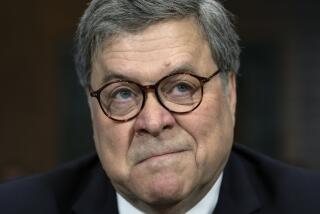Text of the Memo From Wallach to Meese
- Share via
WASHINGTON — Here is the text of a memo from lawyer E. Robert Wallach to Atty. Gen. Edwin Meese III on a proposed Iraqi pipeline:
MEMO TO: EMIII
FROM: erw
DATE: 25 SEPTEMBER 1985
PERSONAL & CONFIDENTIAL--FOR YOUR EYES, ONLY
I hesitate to provide the following information to you in memorandum form. I’m constantly torn between my own feelings of privacy and the need to provide you with information in a form which will expedite communication. The following are specific items of information which B. R. (Bruce Rappaport) provided to me.
1. When Edgar Bronfmann (president of the World Jewish Congress) met with (Soviet leader Mikhail S.) Gorbachev in Moscow, he was advised to transmit a message to Peres to the effect that they would be willing to allow the flow of Soviet Jews to Israel only. (You may recall my memo quite awhile ago, in which I expressed to you my own frustration at the conflict between U.S. American Jews and the State of Israel which occurred in Vienna. At that juncture point, there was a competition and most of the Soviet Jews, especially the best trained and younger, were coming to the U.S. I said at that time that this provided an excellent rationale for the Soviets to restrict the immigration.) In addition, apparently (French President Francois) Mitterrand has offered the services of Air France to the Soviets for the purpose of emigration.
2. B. R. has been financing private polls for quite a long time in Israel on behalf of labor-Peres. They demonstrate an increasing strength for labor and the high probability of elections, no later than March 1986.
3. He confirmed the arrangement with Peres to the effect that Israel will receive somewhere between $65-$70 million a year for ten years out of the conclusion of the project. What was also indicated to me, and which would be denied everywhere, is that a portion of those funds will go directly to Labor.
For both this information, and the emigration above, the obvious rationale needs to be kept well in mind. There is a need to provide Israel with an increasing flow of Ashkenazy Jews (from the Soviet Union) to help balance the influx of Sephardic-Oriental Jews who have a natural affinity and affiliation with Likud. From the standpoint of American interests, the advantage is evident.
4. B. R. indicates that Peres emphatically indicated that the release of (American hostage the Rev. Benjamin) Weir was as a result of the efforts of the State of Israel, and no one else. He indicated that they would also arrange for the release of the remaining six. There is a feeling that the U.S. “owes” and that the accomplishment of this project, as outlined in my memo, is appropriate. It should be emphasized that things are seen in a totality of the relationship but that in this instance, they are uncertain and a bit frustrated as to why the U.S.G. has not more directly facilitated the accomplishment of this project when it is so obviously in the interest of everyone involved.
5. There is to be a OPIC (Overseas Private Investment Corp.) meeting in Vienna October 6. B. R. intends to send his representative (former Minister of Energy (Humberto) Calderon of Venezuela--who is now a member of his Board of Directors and an employee) to Vienna to meet with Minister Taki (former Iraqi Oil Minister Kassim Ahmed Taki), the Iraqi who is in charge of their oil entity (see my previous memo). Apparently these men know each other very well. At that time, Bruce intends to communicate to Iraq, through Calderon, the private banking proposal which he is prepared to put together which would provide funds to Iraq as indicated in my previous memorandum.
6. The prime minister is very sensitive to the letter which he sent. He wants it returned if there’s not going to be some kind of appropriate response when he comes to Washington. That appropriate response would clearly be a meeting with the President and with (then-National Security Adviser Robert C.) Bud McFarlane which would include this project. As you saw from the letter, he also includes Secretary of State Shultz and I have expressed myself as to whether or not that is appropriate. In any event, they apparently find it hard to understand why McFarlane is not able to comunicate to Iraq, and to S. H. (Saddam Hussein, Iraqi president) the importance of this project.
N. B. I have explained to them the reluctance to become involved in the promotion of a private venture. Of course, they don’t see it in that light, but rather in the total context of the geo-politics of the Middle East.
7. There was a suggestion that I call the P. M. of the middle country to see what is happening and see if I could prod him along. I indicated I did not think that was appropriate at this moment. I also told him that I had had a brief and private conversation with (then-CIA Director) Bill Casey and had invited me to meet with him in a non-discussion. The trip to Geneva intervened.
More to Read
Sign up for Essential California
The most important California stories and recommendations in your inbox every morning.
You may occasionally receive promotional content from the Los Angeles Times.













